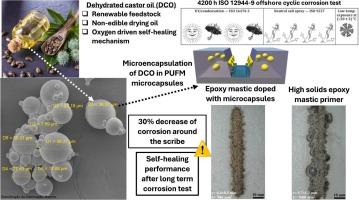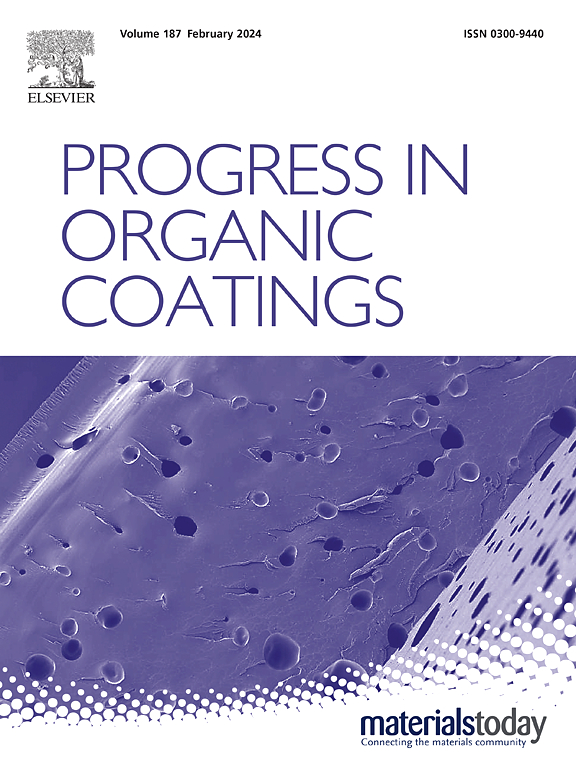含脱水蓖麻油的微胶囊作为智能防腐涂料的自修复剂
IF 6.5
2区 材料科学
Q1 CHEMISTRY, APPLIED
引用次数: 0
摘要
本研究通过原位乳液聚合法合成了含有脱水蓖麻油(DCO)的新型聚(脲醛-三聚氰胺)微胶囊,以促进环氧涂料的自愈合。脱水蓖麻油是一种绿色、低成本的干燥油,其干燥度介于亚麻籽油和桐油之间,可通过氧化聚合实现自修复。扫描电子显微镜(SEM)显示,微胶囊呈球形,形态光滑,外壳厚度约为 500 纳米。通过激光衍射,微胶囊的平均直径为 24 μm。经索氏提取法测定,核心含量和封装率分别为 86% 和 81%。微胶囊以 15 wt% 的负载量掺入高固体环氧胶泥底漆中。用环氧底漆(含或不含微胶囊)和聚氨酯面漆对经过喷砂处理的碳钢基材进行涂覆。尽管拉拔力有所降低,但含有微胶囊的涂层附着力仍然很高,超过了 10 兆帕,失效模式是在底漆中产生内聚。在 0.1 mol/L NaCl 溶液中浸泡一年后,无缺陷涂层的电化学阻抗谱(EIS)结果表明,微胶囊保持了涂层原有的阻隔性能。掺杂了含有人工缺陷的微胶囊的涂层通过 EIS 显示出更高的阻抗值,而通过扫描振动电极技术(SVET)显示出更低的电化学活性,这表明脱水蓖麻油膜通过氧化聚合提供了自修复保护。经过 4200 小时的 ISO 12944-9 海洋结构循环腐蚀试验,微胶囊的自修复性能得到了证实,微胶囊减少了划线周围 30% 的腐蚀,弥补了新型智能颗粒的开发及其在自修复涂层中的长期性能之间的差距。这项研究表明,含有脱水蓖麻油的微胶囊即使在腐蚀性极强的环境下也能为环氧涂层提供长期的自修复保护。本文章由计算机程序翻译,如有差异,请以英文原文为准。

Microcapsules containing dehydrated castor oil as self-healing agent for smart anticorrosive coatings
In this work, novel poly(urea-formaldehyde-melamine) microcapsules containing dehydrated castor oil (DCO) were synthesized by in situ emulsion polymerization to promote self-healing for epoxy coatings. DCO is a green and low-cost drying oil with intermediate drying between linseed oil and tung oil, providing self-healing through oxidative polymerization. Scanning electron microscopy (SEM) showed microcapsules with a spherical and smooth morphology with a shell thickness around 500 nm. Microcapsules obtained a mean diameter of 24 μm by laser diffraction. The core content and the encapsulation yield were 86 wt% and 81 %, respectively, as determined by Soxhlet extraction. Microcapsules were doped at 15 wt% loading to a high solids epoxy mastic primer. Abrasive blasted carbon steel substrates were coated with the epoxy primers (with or without microcapsules) and a polyurethane topcoat. Despite decreasing the pull-off force, adhesion of coatings containing microcapsules was still high and above 10 MPa and failure mode was cohesive in the primer. Electrochemical impedance spectroscopy (EIS) results of coatings without defect, after 1 year of immersion in 0.1 mol/L NaCl solution, showed that microcapsules preserved original coating barrier properties. Coatings doped with microcapsules containing an artificial defect showed higher impedance values by EIS and lower electrochemical activity by scanning vibrating electrode technique (SVET), pointing out the self-healing protection provided by dehydrated castor oil film by undergoing oxidative polymerization. Self-healing performance was confirmed after 4200 h of ISO 12944-9 cyclic corrosion test for offshore structures, where microcapsules reduced 30 % of the corrosion around the scribe, bridging the gap between the development of novel smart particles and their long-term performance in self-healing coatings. This work demonstrates that microcapsules containing dehydrated castor oil can provide long-term self-healing protection to epoxy coatings even under very corrosive atmospheres.
求助全文
通过发布文献求助,成功后即可免费获取论文全文。
去求助
来源期刊

Progress in Organic Coatings
工程技术-材料科学:膜
CiteScore
11.40
自引率
15.20%
发文量
577
审稿时长
48 days
期刊介绍:
The aim of this international journal is to analyse and publicise the progress and current state of knowledge in the field of organic coatings and related materials. The Editors and the Editorial Board members will solicit both review and research papers from academic and industrial scientists who are actively engaged in research and development or, in the case of review papers, have extensive experience in the subject to be reviewed. Unsolicited manuscripts will be accepted if they meet the journal''s requirements. The journal publishes papers dealing with such subjects as:
• Chemical, physical and technological properties of organic coatings and related materials
• Problems and methods of preparation, manufacture and application of these materials
• Performance, testing and analysis.
 求助内容:
求助内容: 应助结果提醒方式:
应助结果提醒方式:


